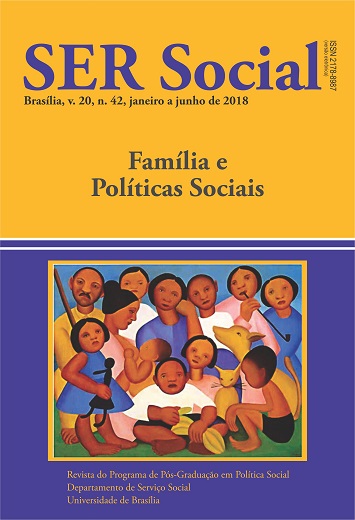Frantz Fanon:
capitalism, racism and the sociogenesis of colonialism
DOI:
https://doi.org/10.26512/ser_social.v20i42.14288Keywords:
Frantz Fanon; sociogenesis; colonialism; racializationAbstract
Frantz Fanon’s analysis of colonialism encompasses both the impact of the social world on the emergence of human senses and identities as well as the individual and collective situations of historical re-signification of the world. However, this approach has been received in a non-consensual way by the specialized literature, hanging over seizures that sometimes emphasize its macro-political and / or economic aspects, or the subjective / psychic and / or cultural aspects of its reflection. In critical contrast to this polarization, this article resumes the Fanonian concept of “sociogenia” and identifies it as the structuring basis of its theoretical proposal. Nevertheless, he argues that this framework points to the reflexive determination between capitalism, colonialism and racism and, above all, to the historical possibility of an emancipatory anticolonial praxis that covers both the objective and the subjective aspects of human existence. In order to base this position, it uses several passages produced by the author throughout his theoretical trajectory.
Downloads
References
BHABHA. “Day by Day... with Frantz Fanon”. In: Alan Read (Ed.). The fact of blackness: Frantz Fanon and visual representation. Seattle: Bay Press, 1996, p. 186-205.
BIRD-POLLAN, S. Hegel, Freud and Fanon: the diabetic of emancipation. London and New York: Rowman & Littlefield International, 2015. (Creolizing the Canon).
BRENNAN, Timothy. Apuestas subalternas. New left review, n. 89, 2014.
BURAWOY, M. O marxismo encontra Bourdieu. Campinas: Unicamp, 2010.
BUTLER, J. Undoing Gender. Minneapolis: University of Minnesota Press, 2004.
CHOW, R. Female sexual agency, miscegenation, and the formation of community in Frantz Fanon. In: Alessandrini, A. FRANTZ FANON: critical perspectives. London and New York: Routledge, 1999.
CROWELL, J. Marxism and Frantz Fanon’s Theory of Colonial Identity: parallels between Racial and Commodity-Based Fetichism. Scientifica Terrapin, 2011.
DUNAYEVSKAYA, R. Philosophy and revolution: From Marx to Mao and from Hegel to Sartre. Detroit: News and Letters, 1989.
FANON, F. Peau noire, masques blacs. Editions du seuil: 1952.
FANON. Pour la révolution africaine (écrits politiques). François Maspero: 1964.
FANON. Les damnés de la terre. Paris: François Maspero, 1968.
FANON. Em defesa da revolução africana. Lisboa: Sá da Costa, 1969.
FANON. Pele negra, máscaras brancas. Salvador: Edufba, 2008.
FANON. Os condenados da terra. Juiz de Fora: UFJF, 2010.
FAUSTINO, Deivison. Por que Fanon, Por que agora? Frantz Fanon e os
fanonismos no Brasil. Tese de Doutorado. Programa de Pós-Graduação em
Sociologia da UFSCar. São Carlos-SP, 2015.
GIBSON, N. Is Fanon relevant? Toward an alternative foreword to “The
Damned of the Earth”. Human Architecture: Journal of the Sociology of
Self-Knowledge, v. Special Double-Issue, Summer 2007, p. 33-44.
GORDON, J. A. Revolucionários em tempos contrarrevolucionários:
desenvolvendo a consciência nacional fanoniana no século XXI. Meritum,
v. 8, n. 1, p. 259-277
GORDON, L. What Fanon Said: a philosophical introduction to his life
and thought. Fordham University Press Publication, 2015.
HARVEY, D. Seventeen contradictions and the end of capitalism. Profile
Books, 2014.
HALL, S. The after-life of Frantz Fanon: why Fanon? Why now? Why black
skin, white masks? In: READ, A. (Ed.), The Fact of Blackness: Frantz Fanon
and visual representation. London: Institute of Contemporary Arts and
International Visual Arts, 1996.
HALL. The work of representation. In: HALL, Stuart (Org.).
Representation: cultural representation and cultural signifying practices.
London/Thousand Oaks/New Delhi: Sage/Open University, 1997.
MERCER, M. Mirage: enigmas of race, difference and desire. London:
1994.
HALL. Decolonisation and disappointment: reading Fanon’s sexual
politics. In: READ, A. (Ed.). The Fact of Blackness: Frantz Fanon and
visual representation. Seattle: Bay Press, 1996.
RABAKA, R. Africana Critical Theory: reconstructing the black radical
tradition, from W.E.B. Du Bois and C.L.R. James to Frantz Fanon and
Amilcar Cabral. Lanham, MD: Rowman & Littlefield, 2009.
RABAKA. Forms of fanonism: Frantz Fanon’s critical theory and the dialectic
decolonization. Lanham, MD: Rowman & Littlefield, 2010.
RABAKA. Revolutionary fanonism: on Frantz Fanon’s modification of marxism and decolonization of democratic socialism. Socialism and Democracy, v. 25, 2011.
ROBINSON, C. The appropriatton of Frantz Fanon. Race and Class, v. 35, n. 1, 1993.
ROBINSON. Black Marxism: the making of the black radical tradition. The University of North Carolina Press, 2000.
ROLLINS, Judith. ‘And the Last Shall Be First’: The Master-Slave Dialectic in Hegel, Nietzsche and Fanon. Human Architecture: Journal of the Sociology of Self-Knowledge, v. 5, n. 3, 2007.
SEKYI-OTU, Ato. Fanon’s dialectic of experience. Cambridge, MA: Harvard University Press, 1996.
SEKYI-OTU. Fanon and the possibility of postcolonial critical imagination. University of Ghana, Legon, 2003.
WYNTER, S. Towards the Sociogenic Principle: Fanon, The Puzzle of Conscious Experience, of “Identity” and What it’s Like to be “Black”. Collection of Essays National Identity and Sociopolitical Change: Latin America Between Marginizalization and Integration. University of Minnesota Press: 1999.
Downloads
Published
How to Cite
Issue
Section
License
 Todo o conteúdo deste periódico, exceto onde está identificado, está licenciado sob uma https://creativecommons.
Todo o conteúdo deste periódico, exceto onde está identificado, está licenciado sob uma https://creativecommons.
Copyright: Os autores serão responsáveis por obter o copyright do material incluído no artigo, quando necessário.
Excepcionalmente serão aceitos trabalhos já publicados (seja em versão impressa, seja virtual), desde que devidamente acompanhados da autorização escrita e assinada pelo autor e pelo Editor Chefe do veículo no qual o trabalho tenha sido originalmente publicado.








